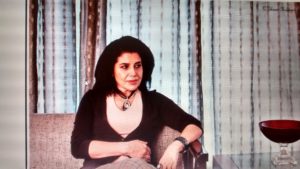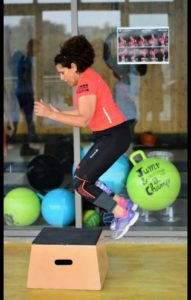‘One is as old as they think they are’

Rajkumari Sharma Tankha
An entrepreneur, a philanthropist, an athlete, a model, an actor… There are many more hats Madhu Singh dons. At 60, when most people her age choose to lead a retired life, she started Cross-fit and stood first from Indian region (over 60 years group) which makes her Asia rank 5 and world rank 331. We talk to this multi-faceted woman…
Tell us about yourself and your family…
I was born in Bulandshahr, Uttar Pradesh. My father, Ch Sardar Singh, came from an Army background as my grandfather was a risaldar (commander of a risala {mounted troop} in Persian, risaldar is a mid-level rank in cavalry and armoured units of the Indian Army during the British Raj). My father was commissioned into the Artillery as a second lieutenant but he served for a few years. He then pursued a career in law and practiced as a lawyer. My maternal grandfather too a lawyer and subsequent to his career in law, he pursued his passion: agriculture and farming in his native village.
My initial schooling happened in Bulandshahr. I graduated from RG College, Meerut, completed my post-graduation from St John’s College, Agra and did M Phil from Delhi University. I had received a UGC grant for further research in entomology which I could not complete as I got married and had to move to a different station.
I have an elder brother who was an Air Force fighter pilot before turning into an entrepreneur and a younger sister who is married to an armored core officer.
Army officers hop from one city to the other so how and where did you set up Harness India. From studying entomology to setting up a soft furnishing company, how did this change happen? What sort of hiccups did you come across while setting your own unit?
I wish everybody to have this experience of staying at multiple different stations and shifting frequently as it exposes you to different conditions which helps in building fortitude and emotional strength. I set up Harness India in Roorkee in 1995 as the city was filled with talented craftsmen and women who make the best cross-stitch in India.
The craft was introduced in the area by British officers’ wives during the colonial era. Roorkee served as the headquarter for Bengal Sappers and the remnants of the beautiful upholstery can be seen in the interiors and furnishings of the establishment.
I saw a huge potential in this field, for both local artisans and myself and showed a few samples to the Cottage Emporium in Delhi .To my delight, the first consignment was displayed at a prime location and an instant success. We receive a big repeat order and Harness India was born, we wanted Harness India to represent the beautiful woven thread.
Frankly, my start was smooth. Maybe, travelling around India gifted me a special talent: to establish a bond of trust easily and be emphatic towards people.
You then moved to Pardada Pardadi. When did this happen? Did you close down Harness India? If yes, why? If no, who is running it?
In the late 90s, my maternal uncle took premature retirement from Dupont to establish a skill-based school in our ancestral village. He requested me to join him in this endeavour and help him establish the school. I brought my expertise in establishing the school, its administration and marketing department, all this happened under the aegis of Harness India.
It took me around five years to complete and thereafter, in 2006, I started working on the next project and the nature of business for Harness India changed. From furnishings, it shifted to hospitality and service apartments.
Tell us about your journey of Pardada Pardadi. How many girls enrolled in it in 2000 and where was the centre set up?
Initially, we had planned to enroll around 300 girls but surprisingly not many families were willing to send their daughters to school and hence, we started with 40 girls. The school was set up Anoopshahr district of Uttar Pradesh.
As of now, how many centres are there and how many girls are getting trained there?
Over a period of time, nature and requirement of skills changed dramatically. Handicraft departments have merged to form community development centres where our old students have trained village women. The main activities of these centres are tailoring, incense production and a large scale dairy where as many as 6,500 women are members. They collect milk and supply to Mother Dairy outlets.
Girls are now learning computers, cultural and sports activities are also in focus. A few of our students have been selected in state basketball and kabbadi teams and even gone on exchange programmes to USA.
When you look back at your journey, what thoughts come to your mind?
My journey has been satisfying and I have minimal regrets. Surprisingly, I have not faced much discrimination or stereotypes as I firmly believe if you sell quality, a lot of people promote you as it is beneficial for everyone. I have certainly faced a few hurdles along the ways but I like to graciously take them in my stride and accept them as a part of growing business and try and find solutions.
As a women entrepreneur, your message to upcoming businesswomen?
I would say it is important to get the trust of your clients and imbibe a culture of respect and honesty in your employees and colleagues. Repeat business become easier once you gain the trust of your clients , so that would be my biggest message to other aspiring and upcoming businesswomen.
Your message to 60-plus women …
I would say that one is as old as they think they are. As long as you are engaged mentally in your work and try and stay fit, then you will not feel your age. My advice is to lead a good healthy, happy and positive life and have fun.
A day in your life…
My day starts with either a round of golf or a session at cross-fit gym – normally at 6.30 am. I reach my office at 10 am and then I like to visit as many properties I can and interact with the staff. After work, sometimes I go to the Defence Officers Club in Delhi along with my husband, I sit in the library and read a bit or sometimes we end up having dinner with friends.



